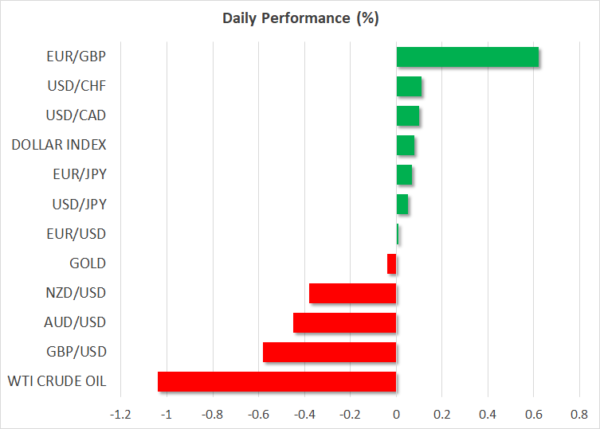- Stock market winning streak continues as yields stabilize
- European nations suspend AstraZeneca vaccine, but euro undaunted
- US retail sales coming up as traders lay low ahead of FOMC meeting
Stable yields give equities the green light
The equity gravy train keeps on rolling. All the major indices on Wall Street aside from the Nasdaq hit another record high yesterday as bond yields stabilized and economic optimism ruled the day. The accelerated pace of vaccinations in America and the imminent spending boom seem to have reawakened a thirst for risk-taking among investors, who are front-running what will probably be a stellar summer in economic data.
Even the risk of a more hawkish Fed tomorrow appears to have been discounted by market participants. Since traders have already priced in an earlier timeline for rate increases, even if policymakers bring forward their rate forecasts to signal a hike in 2023 through the famous ‘dot plot’, that would still be aligned with market pricing and therefore not much of a shock.
In addition, Chairman Powell is almost certain to downplay any hawkish signals during his press conference, perhaps arguing that the economy is still in a deep hole and that the projections in the ‘dot plot’ are only a blueprint for rates, not a commitment.
Is it clear skies for stock markets then? It seems that way, at least in America. Enormous government spending is in the pipeline, vaccinations are proceeding ahead of schedule, and interest rates rising in 2023 is still an eternity away. Outside of a new virus mutation that is resistant to the existing vaccines, it is difficult to envision what can ruin the party.
Euro overlooks discouraging vaccine news
However, everything is not rosy in Europe. Germany, France, and Spain joined Italy yesterday in suspending the AstraZeneca vaccine over fears that it could lead to lethal blood clots. This is the main vaccine that Europe has been supplied with so far, so this is dismal news for the already-slow pace of vaccinations.
Even if it is deemed safe and these decisions are reversed in the coming days, many people will naturally be hesitant to take this shot after all the negative press coverage. This implies that Europe could continue to lag behind America and Britain in vaccinations, which ultimately translates into a lagging economy.
Yet, judging by the lack of a reaction in the euro, market participants seem to believe that this is merely a bump in the road for the European recovery. Or perhaps the market is under-appreciating the impact this episode could have on the European immunization trajectory. Either way, the outlook for the euro seems problematic, especially against the dollar and the pound amid the diverging fortunes in vaccinations.
Dollar firms, pound retreats after Brexit breach
In the broader FX arena, the latest sessions have been characterized by a firmer US dollar, even as stock markets cruised higher too. This highlights the shift in the dollar’s trading dynamics this year, with the reserve currency no longer behaving exclusively as a defensive asset and instead realigning with US fundamentals.
This relationship will be put to the test today when retail sales data for February are released. The forecast is for a modest decline, which is natural after the blockbuster report last month. Indeed, credit card indicators suggest a disappointment is possible, as the cold snap that hit the nation curtailed spending. That said, even in case of a miss, fresh stimulus checks are in the mail.
Meanwhile, sterling is on the retreat after the EU launched legal action against the UK over its decision to delay post-Brexit checks on goods going to Northern Ireland. Brexit risks have flown under the radar lately but could return to haunt the pound considering that the details governing financial services haven’t been settled yet. That said, it’s doubtful whether that would be enough to offset the vaccine enthusiasm.

